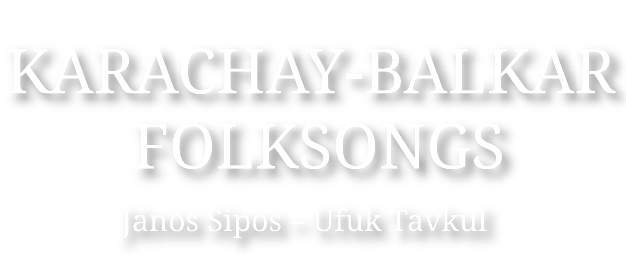

János Sipos started his field work series among Turkic-speaking people 29 years ago. In 1987−1993 he spent six years in Turkey then examined the folk music of the Azeri, Kazakh, Kyrgyz, Turkmen and Karachay-Balkar people. In the present book he gives a survey of the Karachay-Balkar folksongs based on his expedition among these people living in the Caucasus mountains and in Turkey. In chapter one he briefly surveys the expeditions whose aim was the exploration of the eastern connections of Hungarian folk music. Next, he touches on the earlier field trips to the Caucasus which go back as far as the Dominican monk Otto’s journey in 1232, then gives a short account of his field trips among the Karachays. In chapter two the emergence and eventful history of the Karachay people can be read about from the beginnings to the mass emigration fleeing the Soviet expansion in the early 20th century and the deportation of the entire ethnicity in 1947 up to the present day. the earlier Russian and European travellers’ accounts about their social life, stratification, old customs, songs and deities are also conjured up.
In chapter three the reader gets the description and classification of Karachay tunes, together with links to the music of other Turkic groups. it is to be stressed that no synthesis like this of Karachay folk music has been written before. Chapter four contains the scores of 287 tunes with lyrics that well represent the total of 1200 songs. For musically illiterate people the e-book form will make this chapter more enjoyable with a selection of the recordings of the presented 350 tunes. Chapter five describes the Karachay language and the lyrics with an introduction of the ethnographic background. The song texts in standardized Karachay and their English translation are given in this chapter. We do hope that the book will be of use for historians, Turkologists, linguists and the wider public, apart from comparative folk music researchers and ethnomusicologists.
The fieldwork lasting 10 years were supported by the Stein-Arnold Exploration Fund of the British Academy (2010), the Mellon Fellowship for Research in Turkey (2005, 2011) and the Hungarian Scientific Research Fund (OTKA K-42461, K-67997)
The publication of the e-book was supported by the Hungarian Scientific Research Fund (OTKA 115405) and the Pallas Athéné Domus Meriti Fund (EK-G 1018/2020) joint comparative folk music-archeogenetic research to explore the prehistory of Hungarian folk music by computer analysis on large musical and genetic databases. Cooperating partners are the Energy Research Center, the Institute of Humanities and the University of Szeged. Editor: Éva Csáki © János Sipos, 2020, © Pallas Athéné Domus Meriti Fund, 2020, © L’Harmattan, 2015 © Research Centre for the Humanities L'Harmattan France - 5-7 rue de l'Ecole Polytechnique - 75005 Paris T.: 33.1.40.46.79.20 Weblap programing and design: Blankpage Studio